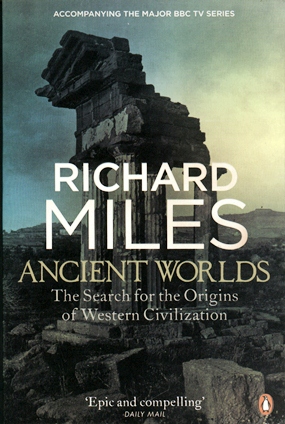Ancient Worlds, The Search for the Origins of Western Civilization (ISBN 978-0-241-95136-1, Penguin Books, 2011) was written by historian Richard Miles to accompany a six part series shown on BBC 2.
Miles is the author of several books on historically significant subjects and has directed archaeological excavation in Carthage and Rome. He is then more than qualified to write on the subject, the origins of western civilization, but as a decided extra for the reader, this book is well written and certainly no dry and boring tome.

Like most school children I could not see where studying history could be of any value. As a young man, my sights were on the future and history was left to look after itself. It was only later that I found that what we are today is determined by what has happened in the past, and the distant past as well. History is more than just a doorway to the past, it is the portal by which we can begin to understand ourselves.
Miles writes in the introduction to the book, “Civilization embodies both the best and worst that humans can do. The story I want to tell you now is not just of ancient worlds that have long passed away. It is the glorious incompleteness of the extraordinary, ongoing experiment of civilization that makes these tales from distant worlds so resonant. It is the story of us, then.”
The Mesopotamian model, from which we have descended, worked as an agrarian society, but one that then produced a surplus of food, which was stored by the temples. This allowed the community to sustain other professions, such as soldiers, builders, musicians, doctors, fortune tellers and prostitutes, but the surplus was maintained by the temple, theocratic government.
As we fought ourselves into the Bronze Age, we produced other problems for ourselves. We could annex complete countries, but who was to make sure our rules were upheld? Courts, public servants and a whole host of different groups were required, and if the king was not astute enough, his kingdom would fall, himself included. “Bronze Age rulers were far more likely to be killed by relatives or courtiers than by foreign enemies on the battlefield,” writes Miles.
In turn Miles takes the reader through Mesopotamia, Egypt (and shows why it had to fail), the Phoenicians, Greece, the Assyrians, Sparta and Athens, the Persian wars, Macedonia, Alexander the Great, the rise and fall of the Roman republic and the Christianization of the Roman Empire.
Miles concludes the book with some soul-searching but done on our behalf, however undeserving. “Civilization has transformed us into a species that, for better or worse, chooses to live alongside strangers, and it is for this simple reason more than any other that we continue to search out ways to make that unlikely choice work.”
At B. 435 on the Bookazine shelves at Big C Extra, this is an excellent book and one that will surprise you at how it can take over your life, even if you have no professed interest in history. You will not want to put it down!




